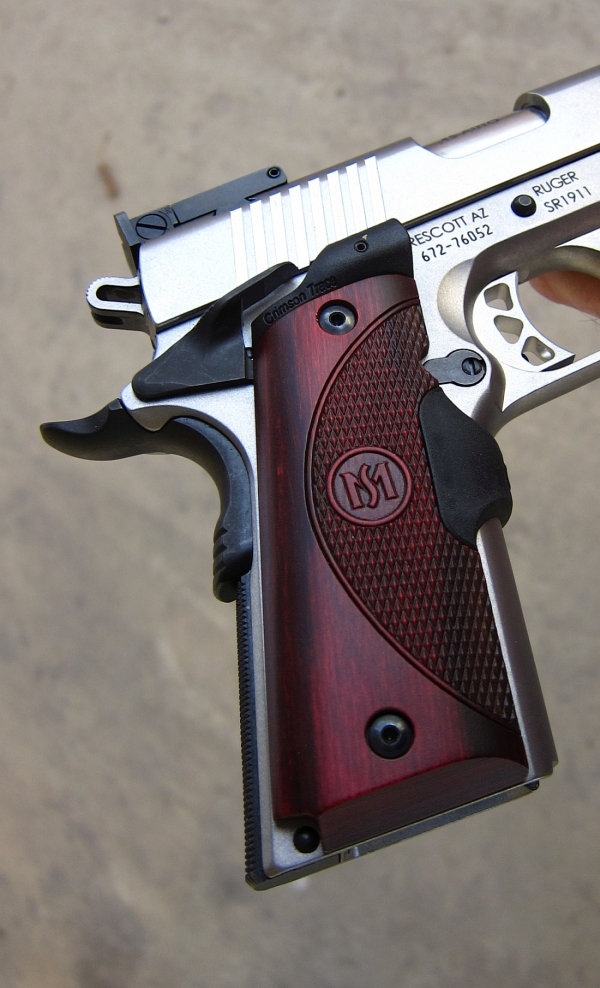
Today marks the 25th anniversary of the founding of Crimson Trace. According to the release, Crimson Trace began in the backroom of a machine shop in 1994 – the year I began writing for law enforcement publications. That was the time of the product that required guns to be sent to the factory for installation of the laser sight to the frame. The gun was the GLOCK pistol.
As of my trip to the factory about four years ago, they were still seeing those ‘machined into the gun’ laser sights periodically come in for service. Since then, the Lasergrip came out – that’s when I came in, brought along by Jim Cirillo (NYPD, US Customs, ret’d) and Clyde Caceres (national class police trainer). They convinced me that the laser sight was practical – though, for me, the more practical use was on the small backup gun. Still, I’ve used them on service-size pistols.
It was a time before the ‘accessory rail’ was common on pistols. The choices were to machine the frame for the emitter, power source and switching or just use ‘grips.’ There were no grips available for my agency’s selected sidearm and we didn’t issue GLOCK pistols. The Lasergrips went on the backup. The S&W Model 442 (satin nickel) pictured has early Lasergrips on board. I still had a Ruger SP101 357 Magnum I’d worn as a backup earlier in the 1990s when Crimson Trace developed Lasergrips for that cannon. A set went on that revolver too.
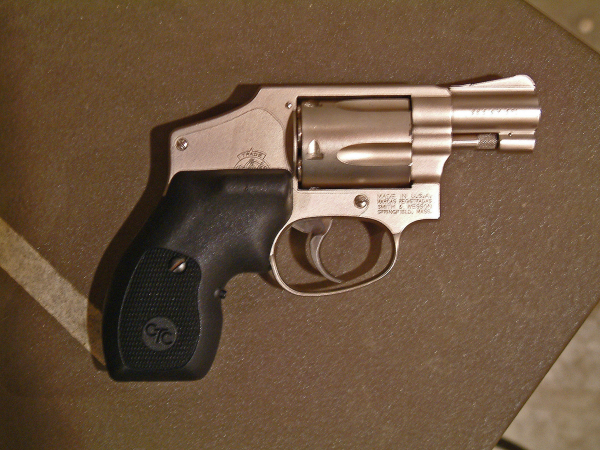
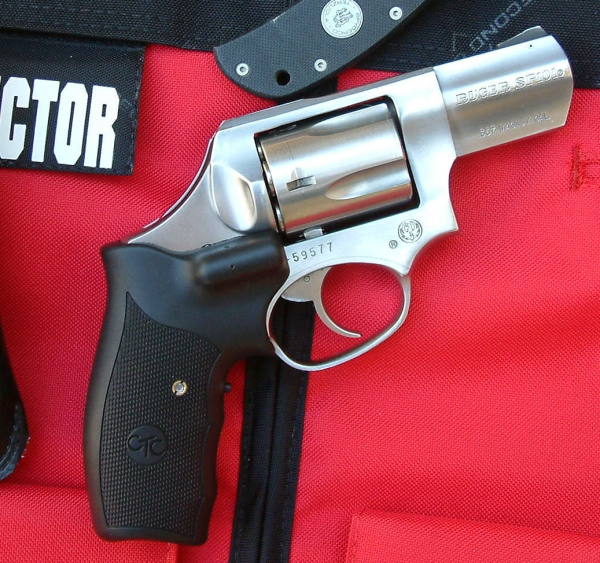
Crimson Trace is fond of the term “Instinctive Activation” and it’s one time that term is properly used. Under stress, the human critter seems to clutch his hands into fists and that’s what activates the laser aiming diode on the Lasergrip. If you only have one hand to use the gun, you still get the dot. If you can’t raise the gun to eye level – due to injury or some other circumstance – you still get the dot.
Control the trigger while maintaining a firm grip and the bullet goes where the dot is – if you took time to zero the Lasergrip. And that’s easy to do.
I said I had a service size pistol I outfitted with Crimson Trace Lasergrips – it was a backstrap, actually, for the M&P40. Along with the Crimson Trace light on the dust cover, I had the potential for positive target ID in adverse light along with a laser aiming device. Gripping the gun turned on both laser and light. They’ve continued to make lasers for backup or small deep concealment guns too – I’ve used the Laserguard on guns like the Ruger LCP and the GLOCK 42. They still have backup guns covered.
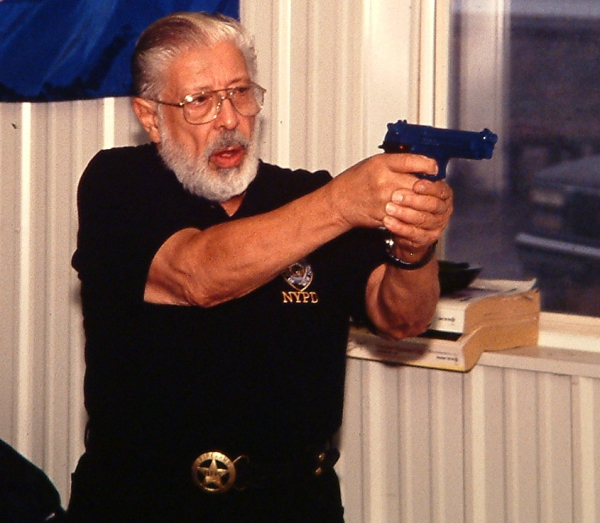
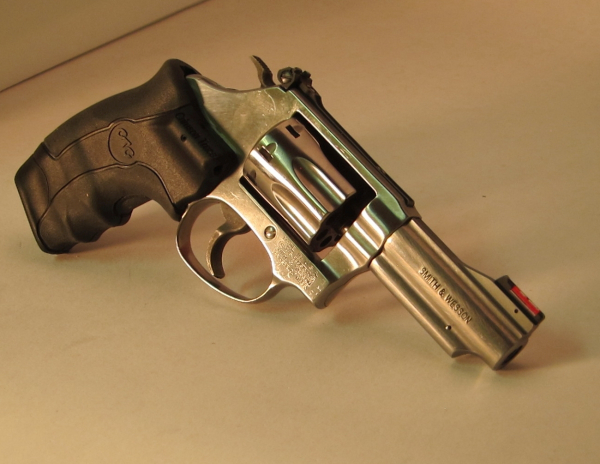
For training purposes, Crimson Trace Lasergrips shine – so to speak. It was Jim Cirillo who showed me the Ring’s Blue Gun training model fitted with Lasergrips that he used for in-class demos and to determine whether students were properly using the “iron sights” on the “pistol” by having the aimer adjusted below the student’s line of sight. To add to their training aspect, Crimson Trace, now the Electro-Optics Division of American Outdoor Brands Corporation, acquired LaserLyte. Known for “firearm training systems, laser sights and bore sights,” the LaserLyte product lines will mesh nicely with Crimson Trace product offerings.
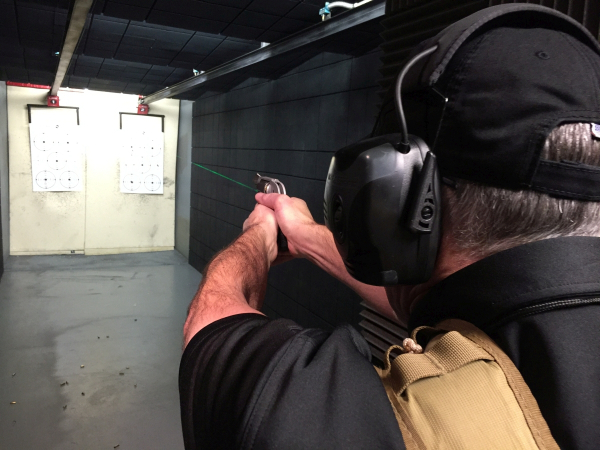
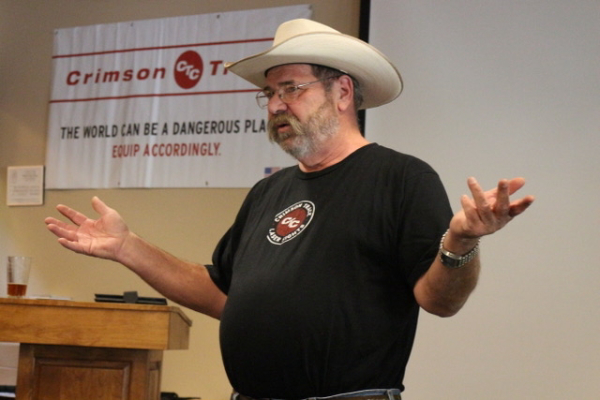
The company clearly has not rested. I had occasion to lunch with founder Lew Danielson during Industry Day just a few weeks ago. He’s retired now and asked me what I thought about the company’s continuing development. I mentioned the move into red dot sights and magnified optics while maintaining a presence in the laser sight market with the new “Lasersaddle” for shotguns. Currently for the Mossberg 500, 590 and 590 Shockwave in 12 gauge, they have “activation points” on both sides of the device which fits over the top of the back of the receiver.
Lew told me he’d kicked around a shotgun aimer a few years back and that he was very happy they’d completed the project.
I’d heard “common taters” (h/t, Claude Werner) complain that Crimson Trace would only produce gear for guns under the brands of the new owner American Outdoor Brands after the acquisition of the company. That wasn’t a pattern I’d noticed with AOBC – and with the advent of the Lasersaddle as well as initiatives with other gun makers, my guess was confirmed.
25 years out, Crimson Trace is a force in the market. I have to confess that I’m not surprised.
- - Rich Grassi